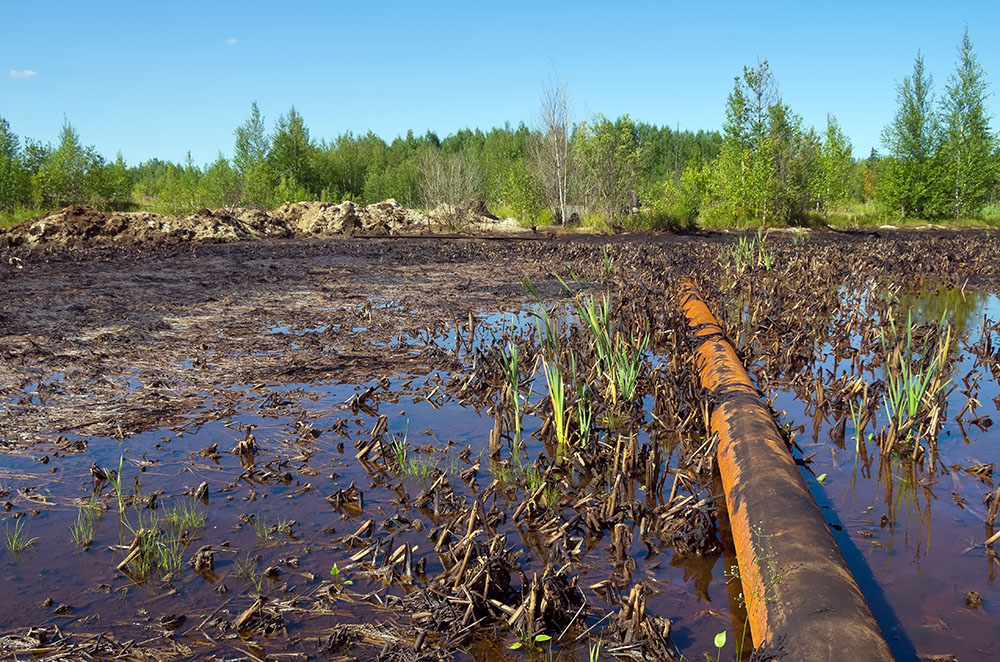Oil spillage poses severe environmental hazards, This article examines the causes, effects, and preventive measures needed to reduce oil pollution and protect ecosystems.
Introduction
Oil spillage is one of the most devastating forms of environmental pollution in the world today. It occurs when crude oil or refined petroleum products are accidentally released into the environment, especially into oceans, rivers, or land surfaces. The effects of oil spills go far beyond the immediate area of impact causing long-term damage to ecosystems, wildlife, soil, and human life. In regions like Nigeria’s Niger Delta, oil spillage has become a recurring environmental crisis, destroying natural habitats and threatening livelihoods.
major causes of oil spillage
1.Pipeline Corrosion
Pipeline corrosion is one of the leading causes of oil spillage, especially in regions where oil infrastructure is old or inadequately maintained. Over time, metal pipelines are exposed to moisture, chemicals, and oxygen, which react with the steel and cause rust and deterioration. This weakens the structure of the pipeline, making it prone to cracks, holes, and leaks.
2.Operational Accidents
Operational accidents often stem from poor maintenance culture, inadequate staff training, and weak safety oversight. In many cases, such incidents are preventable through stricter safety standards, regular equipment inspection, and effective emergency response systems.
3. Oil Theft and Vandalism
Oil theft and vandalism have become some of the most significant contributors to environmental pollution in oil-producing regions, particularly in the Niger Delta of Nigeria. This practice involves the deliberate tampering with oil pipelines and facilities to illegally extract crude oil for personal or commercial gain.
4. Tanker Accidents
Oil tanker accidents are among the most devastating causes of oil spillage, leading to widespread environmental destruction. These accidents occur when large vessels transporting crude oil or refined petroleum products experience collisions, groundings, or structural failures while navigating oceans, rivers, or coastal areas.
5. Blowouts During Drilling
A blowout is a sudden and uncontrolled release of crude oil or natural gas from a well during drilling or production operations. It typically happens when pressure control systems fail, allowing underground oil or gas to surge uncontrollably to the surface.
Effects of Oil spillage
- Water Pollution
Oil spills that enter rivers, lakes, and oceans create thick layers of oil on the water surface. This film prevents sunlight and oxygen from penetrating the water, suffocating marine life.
- Aquatic animals such as fish, crabs, and shellfish die due to lack of oxygen or toxic exposure.
- Drinking water becomes unsafe, affecting both humans and animals.
- Coastal areas and mangroves, which serve as breeding grounds for fish, are destroyed, leading to food shortages for local communities.
In the Niger Delta, thousands of barrels of oil have leaked into creeks and rivers, making once-fertile fishing waters uninhabitable for marine life.
- Soil Contamination
When oil spills on land, it seeps into the soil, blocking air and water movement within the ground. This prevents plants from growing and destroys soil fertility.
- Agricultural lands become barren, reducing food production.
- Toxic hydrocarbons can remain in the soil for decades, making the area unfit for farming.
- Soil erosion and desertification increase as vegetation dies off.
Communities that depend on farming are among the hardest hit, losing their primary source of income and food security.
- Loss of Biodiversity
Oil spillage destroys delicate ecosystems and leads to the extinction of several plant and animal species.
- Birds lose their ability to fly when their feathers are coated with oil.
- Marine mammals such as dolphins and sea turtles suffer from poisoning and hypothermia.
- Forest and wetland plants die off, destabilizing the entire food chain.
This loss of biodiversity affects not only the environment but also cultural and economic systems that rely on nature’s resources.
- Air Pollution
When spilled oil evaporates or is burned during cleanup, it releases toxic gases into the atmosphere, contributing to air pollution.
- These gases such as carbon monoxide, methane, and sulfur compounds can cause respiratory problems and climate change.
- Soot and black smoke from burning oil reduce air quality and visibility in nearby communities.
Long-term exposure to these pollutants can lead to chronic health problems like asthma, lung disease, and cancer.
- Climate Change Contribution
Oil spills add to the global carbon footprint. The burning of oil during accidents or cleanup releases large amounts of greenhouse gases into the atmosphere. Additionally, the destruction of carbon-absorbing ecosystems like mangroves and forests reduces the planet’s ability to absorb CO₂, worsening climate change effects.
- Socioeconomic Impact
Environmental damage caused by oil spills also affects people’s livelihoods and local economies.
- Fishermen and farmers lose their income due to polluted waters and infertile lands.
- Tourism declines in affected areas as beaches and coastal regions become polluted.
- Communities are forced to migrate, leading to overcrowding and social conflicts.
The result is a cycle of poverty and environmental injustice, especially in developing countries where regulations are weak.
Solutions and Preventive Measures
To reduce the environmental hazards of oil spillage, governments, oil companies, and communities must work together by:
- Enforcing strict environmental regulations on oil drilling and transport.
- Using modern technologies like leak detectors, drones, and automatic shutoff systems.
- Implementing rapid cleanup operations immediately after spills.
- Promoting environmental education and awareness among communities.
- Supporting reforestation and soil restoration projects in affected areas.
Conclusion
Oil spillage remains one of the greatest environmental threats to our planet, particularly in oil-producing regions like Nigeria and other parts of Africa. Its impact on water, soil, air, and biodiversity is both immediate and long-lasting. Preventing oil spills and mitigating their effects is not just an environmental duty it is a moral responsibility to protect the earth for future generations.

